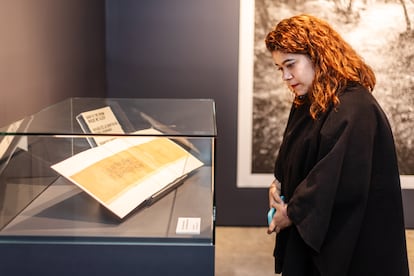To start, the flag is not. Spain is the guest of honor to the International Book Fair of Bogotá (Filbo). In front of the pavilion there is a great scenario where these days have been heard versions of Guns N ‘Roses performed by a group of heavy local, traditional music or also flamenco. The most common in the streets of the fair center is to see kids walk with its school tracksuit and it is not uncommon to see military groups, since the army has stand and recruitment center. The visitors of the Spanish pavilion are not received a flag; but a 20 -meter macramé tapestry, sewn by local artisans, where the motto can be read in Spanish, the co -official languages and even the Aranés and the Asturian: Spain a culture for peace. In the entrance hall a canned voice welcomes. The national account that presents itself has to do with the traditional.
Half year Spain was invited to honor at the Guadalajara Fair (Mexico). In the summer of 2024 the Spanish had been the guest language of the Theater Avignon Festival already at the end of 2025 Barcelona will be the guest at the Great Mexican Book Fair. At the beginning of last December, at the restaurant of the Guadalajara hotel where writers and editors had breakfast, Antonio Monegal could not suppress his enthusiasm by telling how he imagined that it would be the Spanish pavilion for the Bogotá Fair. This professor of comparative literature at the Universitat Pompeu Fabra, which won in 2023 won the National Testing Award, has been the commissioner of the Spanish presence in the Colombian capital.
“The Colombian government’s proposal was to talk about peace,” explains the Secretary of State for Culture, Jordi Martí. “Monegal was the best candidate because since his exhibition At war At the Center for Contemporary Culture of Barcelona (CCCB) has been dedicated to studying the presence of the conflict in culture and to think how language about war can help in the path of peace. ”
This cultural interpretation of the conflict, synchronized with the memory policies promoted by Colombian governments, have their best expression in the exhibition of photographs of Francesc Torres on the common graves of the civil war and the forensic documentation of a common grave in Bogotá. It was inaugurated by the Minister of Culture, Ernest Urtasun, at the Center for Memory, Peace and Reconciliation (CMPR) of Bogotá, a few minutes from the filbo.
It is no accident that The abyss of oblivion, by Paco Roca and Rodrigo Terrasa, be it the first comic of the showcase that opens the exhibition Drawn memory, that can be seen in the Spanish pavilion. There are those wounds that crawl from the civil war, but that time trial of contemporary Spain is not limited to that conflict. There are huge sequences of vignettes on the walls, samples of books that testify to the quality of Spanish cartoonists and their courage both aesthetic and political when addressing conflicts from another look. “Our grandparents were forced to fight. Our parents forced them to forget. We have the past, to remember the future,” the text that accompanies the vignettes of Frank, of Ximo Abadía. That critical vision closes the exhibition: they are vignettes of In transition, by Ana Peñas, and propose a rereading of how Spanish contemporary history has told.
The rereading of the past from the culture, from his own works, was one of the threads that Javier Cercas and Juan Gabriel Vásquez threw in the dialogue they maintained in the filbo. Vásquez, citing Camus, referred to the literature of dissent and his ability to tell things in a different way from those of official history. “Tell what you can’t tell otherwise,” the two agreed when talking about their novels without fiction. And that other way, which has to do with a different understanding of the recent past from Spain and Colombia, is the main hypothesis that explores the Spanish presence in Bogotá.
The anthropologist Andrea García González came to the debate on the memory of the conflict. He lacked five minutes to talk to Kirmen Uribe. Author of the book about the Basque conflict Shut up and forgetGarcía González has been in Colombia for two years with a postdoctoral scholarship to study memorial matters. And before arriving at the Pavilion Auditorium, he visited the other exhibition. It is titled Looks that are going throughSandra Maunac commissioned her and brings together the photographic works of artists such as Laia Abril or Nicolás Combarro, among others. One of the works is Clemente Bernard, is titled Nearby / Cerca de Aquí and brings together about 30 black and white photos of the Basque conflict. What is seen resonates in a Colombian young couple, hooked on each of the photos (burials, hooded, landscapes, pain, a lot of pain), and shook García González.
In Looks that are going through There is not only Spanish memory. Alicante Cristina de Middel presented a critical project focused on Mexico, or Ana Núñez Rodríguez, from Lugo, explores a massacre that occurred in a Colombian municipality from the United Fruit Company archive. At the same time, unpublished perspectives are offered about the recent Spanish past. Jordi Jon presents an environmental journalism project that analyzes the current trail of the Francoist development model and Jon Valbuena forces to discover the silenced relationship between Spain and Equatorial Guinea.
Could today propose a story like this without being phagocyted by cultural battle? Commissioner Antonio Monegal is rather skeptical. In the colloquium between Uribe and García González there was talk of the existing paradox between Colombia and in Spain. While in the American country, although the conflict is still open, they already have an infrastructure to manage their memory for reconciliation, in Spain there is pending work despite the fact that there is no conflict. Raising the issue is not less. At least it means that the consensual story of the culture of the transition is considered overcome.

